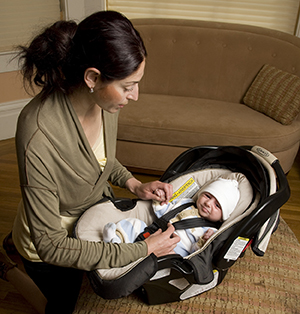Discharge Instructions: Taking Your Premature Baby Home From the NICU
Most preemies are ready to go home when they are:
-
Able to maintain a stable body temperature in an open crib.
-
Breathing on their own without any apnea. Apnea means pauses in breathing that last longer than 15 to 20 seconds.
-
Breathing without a drop in heart rate (bradycardia).
-
On complete breastfeeding, bottle-feeding, or both.
-
Taking in enough calories to gain weight.
-
Able to sleep on their back safely with the head of the bed flat.
What should I do before I bring my baby home?
 |
| A car seat that supports the head helps prevent airway problems. |
-
Make sure you have a car seat appropriate for preemies. This means a rear-facing car seat with a 5-point harness that fits snugly. The car seat should be small enough to support and restrain the baby safely. You may be asked to bring your car seat to the hospital a few days before discharge. This is so it can be checked to be sure it’s right for your infant. Babies born more than 3 weeks before their due date will have a car seat screening before they leave the NICU. Babies at risk for heart or lung problems will also have a car seat screening. Car seat screening tests their breathing, heart rate, and oxygen levels in the car seat before they leave the NICU. Nurses will show you how to do special positioning of the car seat if needed.
-
Schedule a visit with your baby’s doctor. The first appointment should be around 2-3 days after your baby is discharged.
-
If your baby will be using any equipment at home, discuss it with your home health care specialist before discharge. Make sure your house is well equipped and you understand how to use the equipment correctly.
-
If your baby will be going home on any medicines, make sure you know how and when to give the medicines to your baby.
-
If your baby will be going home on a special diet, make sure you know how much to feed your baby and how often.
-
Take a class to learn infant CPR.
Special safety issues for preemies at home
Once they are ready to go home, preemies are much like other young babies. But you may need to be extra careful about certain things:
-
Protect your baby from infections. Breastfeeding or bottle-feeding expressed milk provides more immune protection. But it doesn't prevent all infections. You should wash your hands often with soap and water. So should anybody else who takes care of your baby. Limit contact with visitors. Don't go to crowded public areas. If people in the household are ill, try to limit their contact with the baby.
-
Make your house and car no-smoking zones. Anybody in the household who smokes should quit. Visitors or household members who can’t or won’t quit should smoke only outside, away from doors and windows.
-
Prepare a safe place for sleep in a crib or bassinette. If your baby has an apnea monitor, make sure you can hear it from every room in the house.
-
Feel free to take your baby outside, but don't have long exposure to drafts or direct sunlight.
When to contact the doctor
Contact the NICU if you have questions about the directions you were given at discharge.
Call your pediatrician or doctor if your baby:
-
Has a fever of 100.4°F (38°C) or higher, or as directed by your baby's doctor.
-
Has a temperature below 97.5°F (36.4°C), or as directed by your baby's doctor.
-
Is not interested in feeding, is feeding poorly, or is vomiting feeds.
-
Has fewer than 6 wet diapers per day.
-
Has changes in stools or black or bright red stool.
-
Is crying regularly or is abnormally fussy.
-
Is less active than usual and tired.
Call 911
Call 911 if:
-
Your baby stops breathing or becomes unconscious.
-
Your baby is having trouble breathing or has a change in their breathing pattern. This may include flaring of the nostrils, using belly muscles to breathe, grunting when breathing, or pauses in breathing.
-
Your baby looks blue or pale around the nose, lips, or on the skin.
-
Your baby seems sluggish or has less muscle tone.
Online Medical Reviewer:
Stacey Wojcik MBA BSN RN
Online Medical Reviewer:
Tracy C. Garrett RNC-NIC BSN
Online Medical Reviewer:
Vinita Wadhawan Researcher
Date Last Reviewed:
4/1/2025
© 2000-2025 The StayWell Company, LLC. All rights reserved. This information is not intended as a substitute for professional medical care. Always follow your healthcare professional's instructions.